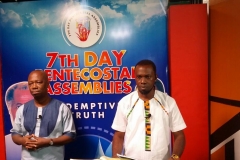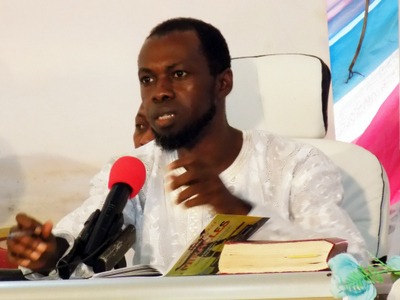The Cooperation between God the Father and God the Son
Questions have raged for centuries about the nature of the Godhead, especially as it relates to the position of Yahshua, the Messiah. But it’s not as if the Bible is silent on the matter. The truth has been made plain in the scriptures:
The Godhead is made up of the Father and His Son Christ. Nothing more, nothing less. It’s a tricky situation.
To ‘limit’ the Godhead to a single Entity is to miss the true knowledge of salvation and likewise to ‘add’ to it. Either way, we lose sight of a vital spiritual truth. The Son has always partnered the Father in all His activities, not least in the field of salvation.
In creating the universe, God worked with and through His Son. In fact, the word “God” as found in Gen. 1:1 is actually “Elohim” (Mighty Ones) in the original Hebrew scriptures, denoting a duality of the creative Deity. (Strong’s Exhaustive Concordance of the Bible, Hebrew Dict. 430).
The duality of the Godhead is made even clearer in Gen. 1:26 which quotes the Elohim as conferring: “Let us make man in our image, after our likeness.” Given the context of the above quotation, God the Father could not be soliloquizing (speaking to Himself) –at any rate He wouldn’t have used the words “us and “our” if He were alone and speaking to Himself.
The introductory passages of the Gospel of John unfold in greater detail the mystery of the Divine Unity comprising the Father God and His Son, known as the Word, that is Jesus Christ, our Lord and Saviour. (John 1:1-4).
The Gospel of John further reveals the unique positon of Christ as the instrument of Creation used by the Father to bring the universe into being—and He’s very God just like His Father. ( Col. 1:16-18; Eph. 3:9; Philipp. 2:5-6}. In Hebrews I:8, the Father eulogizes the Son, calling Him God: “… unto the Son He saith, Thy throne, O God , is for ever and ever: a sceptre of righteousness is the sceptre of thy kingdom .”
Indeed, as the Apostle Paul explains, “in Him [Christ] dwelleth the fullness of the Godhead bodily.” ( Col. 2:9). That’s why He could boldly declare: “I am the way, the truth, and the life: no man cometh unto the Father, but by me.” ( John 14:6; see also Matt. 11:27). The scriptures state emphatically that it’s a complete departure from the truth of God, to deny either the Father or the Son because to deny One is to deny both. “The doctrine of Christ” stipulates that believers accept both the Father and the Son. (1John 2:22-24; 2 John 1:9-11).
Let’s not be mistaken. To reject the Father or the Son is no trifling matter; it strikes at the heart of true faith. Yet many religious groups profess beliefs that either deny the Son as divine or teach the doctrine of a triune God. Those who reject the divinity of Christ usually take issue with the many New Testament scriptures that espouse this very truth, claiming the Old Testament does not teach so. But then, it’s not only the N.T. that talks about the Divine Sonship of Christ or even the fact that God has a Son. The O.T. also teaches that God indeed has a Son, and a Son who has a name:
“Who hath ascended up into heaven, descended? …who hath established all the ends of the earth? What is His Name , and what is His Son’s name , if thou canst tell?” (Prov. 30:4).
Thus in either Testament, both direct and indirect allusion is made to the Divine Sonship and Deity of Christ. What about the trinity? Well, it’s extra-Biblical. The scriptures, when properly interpreted with the help of God’s Spirit, do NOT support the doctrine of the trinity (3 persons in the Godhead). In fact, the teaching that the Holy Spirit constitutes the 3 rd Person of the Godhead is not only a gross misinterpretation of scripture, but also a gross misrepresentation of the present spiritual ministry of Christ.
The Holy Spirit/Ghost is none other than the power (or Spirit)of Christ in the lives of believers; the Spirit is not a separate God-entity. The very term “Holy Ghost” is suggestive of the spirit of a dead person come back to life, in this case the Spirit or Ghost of the crucified and resurrected Christ imparted to the Church as occurred on the day of Pentecost. The following scriptures make it abundantly clear that Christ and the Holy Spirit are one and the same:
Acts 20 : 28 : The Holy Ghost (who is Christ) purchased the church with His blood. From the scriptures we know that it was Christ who died on the cross and purchased the church with His blood, and so He is the same as the Holy Ghost.
Rom . 8:9 & 2 Cor . 3: 17 : Jesus Christ our Lord is “that Spirit,” called The Holy Spirit which binds us to Him.
Acts 1:4-5; Gal . 4:6: The fulfilled “promise of the Father” is “the Spirit of His Son” sent into our hearts, “crying Abba Father.”
The truth could not be plainer: The Holy Spirit is “Christ in us” (2 Cor. 13:5; Col. 1:27). There is no other mediator between God and man except Yahshua who is God but became flesh or human for the sake of our salvation. (1 Tim. 2:5; Philip. 2:5-11; 1 Tim. 3:16).
A trip to heaven confirms just this situation. On the heavenly throne sit the Father God and His Son Christ; there is no third person on the throne of glory. (Rev. 22:1; Acts 7:55-56; Psalm 110:1).
Furthermore, the call to baptize converts in the name of the Father, the Son and the Holy Ghost is not proof of the trinity doctrine. (Matt. 28:19). The use of the word “name” (singular), instead of names as should have been the case if the scripture were referring to three distinct Personalities, shows that all three titles refer to One Personality—Jesus, the Christ. For He is not only “the express image” of His Father and so called “the everlasting Father” in prophecy (Heb. 1:3; Isa. 9:6), but also the Son and the Holy Spirit all rolled into one.
The Apostle Peter fully understood this mystery. Consequently on the day of Pentecost, he baptized the new converts who received the word in the Name of Jesus only, without referring to His official titles, namely Father, Son and the Holy Ghost. (Acts 2:38; 8:16).
Truly, Christ is our only mediator, High Priest, and the author of our eternal salvation. (1 Tim. 2:5; Heb. 2:17; 4:15; 5:9). We are “complete in him, which is the head of all principality and power.” ( Col. 2:10).
These aren’t empty words. The position of Christ in the Godhead is remarkable. “Christ [is] the power and wisdom of God.” (1 Cor. 1:24 ).
There’s no greater privilege in life than to receive Jesus into our lives via the baptism of the Holy Spirit. The truth of the matter is that once we receive Him into our hearts, we also receive the power and wisdom of God—and there’s no greater power and wisdom beyond!
He was the Rock that followed Israel (1 Cor. 10:1-4); the One who revealed Himself to the elders of Israel as “the God of Israel” (Ex. 24:9-10), the I AM of old (Ex. 3:14; John 8:58). He is the One whose day Abraham saw and was glad (John 8:56, 58; Gen. 18:1-5), the prophesied Messiah “whose goings forth have been from of old, from everlasting.” ( Micah 5:2; Rev. 1:8).
And He has not abandoned the charge His Father gave Him. Christ continues His redemptive work on earth (and advocacy for believers) through His ministers whom He has appointed with His Spirit. Ultimately, all of us are to aspire to “the stature of the fullness of Christ.” (Eph. 4:13).
In this church age in which the Holy Spirit has been poured out on God’s children, Christ still heals the sick, teaches the knowledge of salvation, performs miracles, prophesies, etc., through His anointed people. (1 Cor. 12:8-11).
The unction of the Holy Spirit should be of the greatest importance to believers. It’s the only means by which God the Father and God the Son make their permanent abode with us. (John 14:23).
No achievement is greater than to have “Christ in you, the hope of glory” (Col. 1:27).
He alone has the words of eternal life. (John 6:68). And HE IS OUR LIFE for our life is hid in Him. ( Col. 3:1-3).



